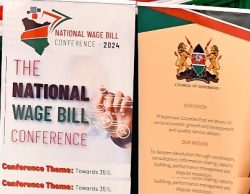
President William Ruto has said that the government is committed to bringing down the public sector wage bill to 35 per cent of the revenue collected by 2027.
He said that while the 2028 deadline set by the Salaries and Remuneration Commission (SRC) is workable, the target should be achieved earlier for faster economic development.
“Our goal of reducing the wage bill from the current 46 per cent to 35 per cent of revenue should be achieved by 2027. There are agencies that have already done this and they confirm to us that with commitment and determination, we can achieve this sooner,” said the President during the closing ceremony of the Third Wage Bill Conference organised by SRC in Nairobi.
President Ruto said the country has to live within its means to avoid burdening citizens with higher taxes and debt.
“About a million of us are working in the public service, taking away Sh1.1 trillion annually of the Sh2.2 trillion collected. This is unsustainable even we seek to raise more revenue,” said the President.
He explained that the government is creating alternative pathways to employment so that the public service is not the only route to job creation.
“As a government, we are implementing programmes that will create jobs. Under the affordable housing, we have created 140,000 jobs and our target is a million. We are intentional in job creation so that we do not burden Kenyans with the public service wage bill,” he said.
Other initiatives the government has initiated to expand employment he said are training the youth on digital skills for opportunities online, facilitating international investors to set up companies at Special Economic Zones and signing agreements with various countries to export jobs.
“Next week, I will be launching an American company at the Athi River Export Processing Zone, which is going to create some 20,000 jobs,” he said.
President Ruto directed those with fake certificates in the public service to resign and refund all the money they have earned over the years.
“A simple audit showed that we had 2,100 people with fake certificates working in government institutions. Such people have undermined service delivery in the public service. Those who have earned money using such papers must refund,” he said.
He noted that the government is working to have a public service that is efficient, professional, productive, competitive, and supports the entire economy.
“We must ask ourselves why is the Kenyan human capacity adored world over, but the same is not happening in the public service. This shows we need to change the way we hire and deploy people in the public service.”
Deputy President Rigathi Gachagua asked those who may have used fake papers to get jobs to take advantage of the Recognition of Prior Learning framework set up by the government to have their knowledge recognised and certified.
“You don’t need to take short cuts by acquiring fake certificates and getting jobs in the public service. If you have the skills, let them be recognised,” he advised.
Mr Musalia Mudavadi, the Prime Cabinet Secretary and the Cabinet Secretary Foreign and Diaspora Affairs, said the government is keen on making tough decisions to reduce the wage bill and transform the country.
Mr Moses Kuria, the Cabinet Secretary for Public Service, Performance and Delivery Management, said the ministry would migrate all public servants to a new system of performance management.
“I am also going to seek Cabinet approval so that all staff establishments in all government agencies suspended and reviewed as part of measures to reduce the wage bill,” he said.
As part of mandate to enhance government communication, the Kenya Yearbook Editorial Board (KYEB) will use its publications to promote public awareness on the importance of having a sustainable wage bill and highlight what the government is doing towards the attainment of the 35 percent of wage bill to revenue ratio.
